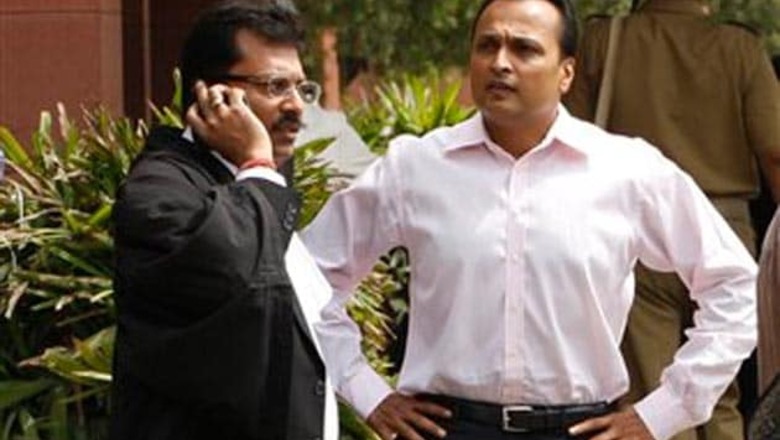
views
It was the last item on the agenda but certainly not the least complex one. In 2005, in the third floor of their Colaba residence, the Ambani brothers were in the last lap of negotiating the final points of their family contract, splitting amongst themselves assets worth several billions of dollars. But there was one vexed issue that remained unresolved even after three days of hectic parleying: How to divide the spoils from Reliance's huge gas find in Krishna Godavari basin. It was holding up the settlement and elder brother Mukesh grew impatient. "At the end of months of negotiation, Mukesh just wanted to get over with the deal and signed away a part of the gas find quickly," says one of his close aides.
A battery of executives who worked on Mukesh's side had then advised him to refrain from making any deal on the gas yet. They argued that since it was still unclear how much Reliance will have to invest or how much gas will eventually be available for sale, it may too early to make on committing a steady supply of gas to Anil.
But in the heat of the moment, eager to wrap up the settlement, Mukesh agreed to give away a sizable portion of the gas to his brother for 17 years.
It was a very important gain for Anil, the younger brother. He knew that the already proven reserves of KG Basin were worth quite a bit and Reliance had invested a fair bit of money in exploration. So if the family assets were to be split, he would get his fair share of the gas or an equivalent value. As Anil needed gas for his upcoming power project, he asked for an assured supply to his plants rather than any other equivalent consideration.
Anil got a lot of gas at a good price – enough to fuel his ambition to become one of the largest private sector companies in power generation. But little did he realise that this clause in the family settlement would collapse midway and it would take an arduous legal journey before he can lay his hands on the gas at a much higher price.
Mukesh had agreed to give gas to Anil's company Reliance Natural Resources Ltd. (RNRL) subject to "government approval". These two innocuous words eventually drove the brothers to an ugly court battle and even prompted the prime minister's office to intervene.
The settlement took place in June 2005. But by early next year, it had become apparent that Mukesh's camp was not ready to keep its word on the gas deal. In late 2004, when the two brothers were still together, Mukesh, as a director of Reliance Energy, had assured gas to Anil's power project in Dadri, Uttar Pradesh. This was also ratified by other directors of RIL who were also on the board of Reliance Energy. After the brothers broke up, Reliance Energy, Reliance Infocomm and Reliance's financial businesses went to Anil while Mukesh got the flagship RIL.
By virtue of the arrangement at that time, the company that would eventually supply gas to Anil's Reliance Energy, Global Fuel Management Company (that later became RNRL), was also part of RIL before the de-merger. It continued to remain a part of it months after too, as there were legal processes to be completed before it was de-merged and given to Anil. But, as Anil had resigned from RIL immediately after the family settlement was announced, Global Fuel Management's board comprised mostly of RIL directors.
In early 2006, the directors of board of Global Fuel Management (later RNRL), which had Mukesh's men in majority, changed the terms of gas purchase agreement substantially. They also set aside and not give enough time to J.P. Chalsani, Anil's representative on the Global Fuel Management's board, to respond. His objection was set aside and he was emailed a copy of the sales agreements only after they were passed without discussion by the board. A few days later, Global Fuel Management was re-named as RNRL and spun off from RIL. Anil got the share ownership. So, Anil alleged that Mukesh had unfairly changed the contract, which later became a big part of the court dispute between them.
It is not that Anil did not make mistakes. According to government rules, Reliance had to ensure that there was an "arm's length" distance when it priced the gas. Therefore, to sell to Anil, RIL had invoked the same price as it had offered to the state-owned National Thermal Power Corporation (NTPC). RIL had only issued a letter of intent to NTPC, but since it had won the contract on a global tender, the price looked fair on paper.
However, NTPC never signed the contract with RIL. A senior NTPC official said that RIL had no intention of signing the contract and was only buying time by raising contractual issues repeatedly. A senior RIL executive, who did not wish to be named, said that NTPC wanted to re-negotiate the contract a still lower price. That could have only helped Anil, as his contract was based on NTPC's contract. It is another matter that C.P. Jain, NTPC's then chairman and managing director who was negotiating with RIL, joined Anil's Reliance Infrastructure after his retirement from the state-owned power company.
If NTPC had signed the contract with Reliance, it would have been a different ball game for Anil. He would—at least on paper—have a ratified price for gas supply and his case for supply at the negotiated price in the family contract would have become, enforceable both before the government and the court. Says the RIL executive: "Anil was perhaps a little over zealous."
In some ways, Anil is where he started on the last item on the agenda when the family settlement was drawn. His court loss to his bigger brother will again bring up the issue of carving up the family assets equitably between the two brothers. In short, Anil has to get a share equivalent to the value of gas, as was negotiated and accepted in family settlement. There are three possible ways he can do it. He can accept the court's suggestion and re-negotiate RNRL's deal with RIL or even sell RNRL to Mukesh to encash the value of the gas. He can approach another court for being unfairly dealt with in the family settlement, which the current Supreme Court decision doesn't touch upon. Or he can go back to his mother and seek justice.




















Comments
0 comment